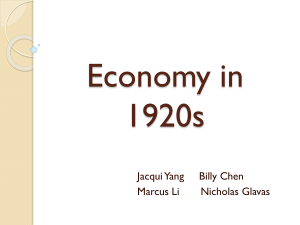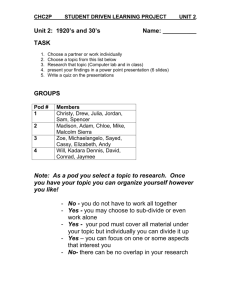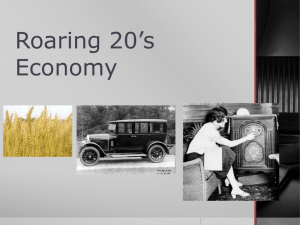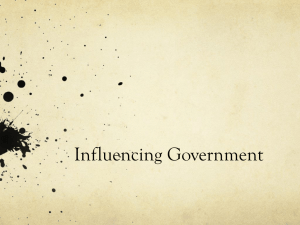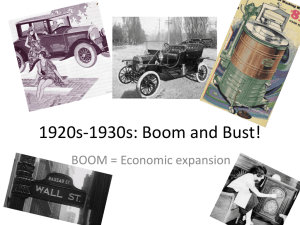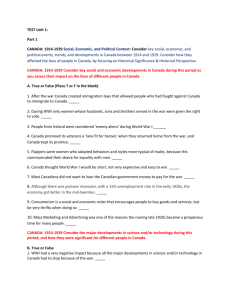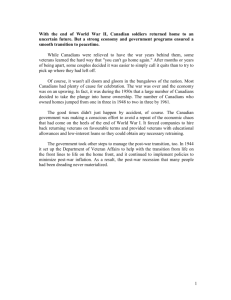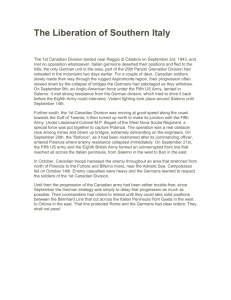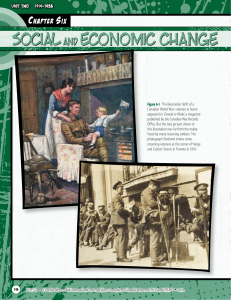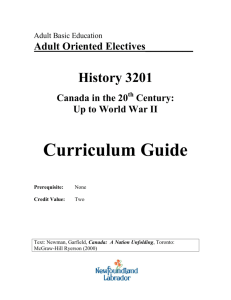The Roaring Economy PPT (Student Handout)
advertisement
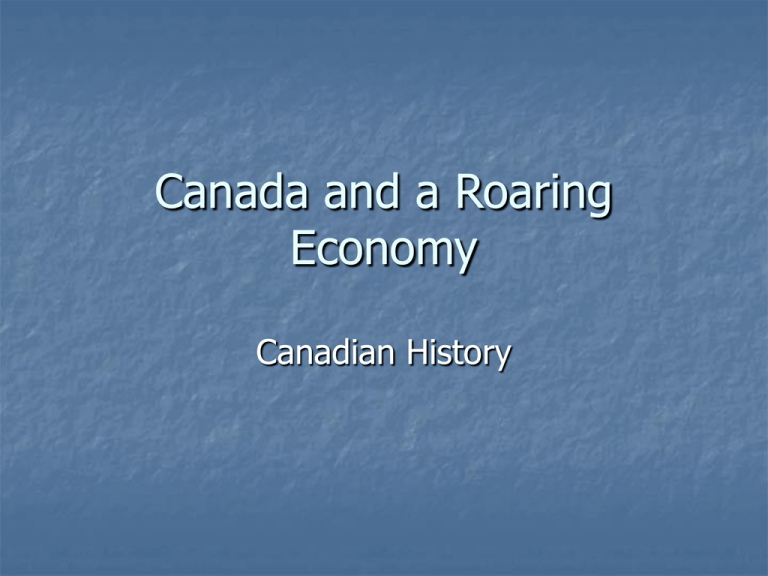
Canada and a Roaring Economy Canadian History Overview The Roaring Twenties saw boom times in Canada. _________________; earnings for individuals and companies were high. Greater disposable income meant a consumer society was being born. Labourers were also thrust to the forefront of social change because of terrible working conditions. Whimper before the Boom During the war Canada's resource industries and manufacturing industries operated at full capacity, even contributing to the war effort. The 1920s started with a short economic ‘whimper’. Industries that __________________________________ __________________________________ __________________________________ ______. Boom in Old and New Industry By 1923-24 the economic slump that followed the First World War was over. World economies had improved and countries ______________________. Demand for Canadian wheat reached record levels in the 1920s. Domestic and foreign industrial demand for __________________________________ _______________________. Agriculture and Mining Production Growth in Industry The Canadian pulp and paper industry expanded rapidly during the 1920s. Demand was huge in the American market. During the 1920s Canada exported more pulpwood and newsprint than the rest of the world combined. Automobiles Automobile production grew ______________________ ________________ industry in Canada. Production of new household products also increased. Radios, record players as well as other labour saving electrical appliances. Tariffs Tariff: _______________________________________ _________________. The federal government introduced tariffs to protect Canada’s manufacturing and industrial base. Example: US made farm machinery was taxed so that it was more expensive than Canadian-made farm machinery. What did this do for Canadian companies? Drastic Change Economic prosperity and new technological developments brought about enormous change. Many people moved into the cities to work in factories or in service industries like ___________, __________, __________________, and ___________. Changes…. Wages were rising for many people and for the first time people could buy stuff on an instalment plan. Beginning of a debt society. Workers had more income......what does this mean? Canada becomes a Consumer Society Along with the 1920s came with a number of consumer products that many Canadian families ‘had’ to have. Mass Media was introduced in the 1920s, in fact, by 1929 there were ____________ in Canada, up from fewer then __________________ (beginning of boom) Mass media = Mass Advertising Don’t Worry - Shop Mass advertising along with job security and higher incomes meant that they could spend money on things other then the basic necessities. There was more ‘disposable’ income. Advertising Advertisers made luxury items seem like necessities to hundreds of thousands of Canadians. There was an astounding range of household goods made available by places like EATONS. Advertising EATONS catalogue was a central feature in every Canadian household. Miracles _________________, hand operated washing machines, ___________, electric toaster, electric stoves, ____________ and ____________. Why did people want to buy things like this? The Biggest Consumer Item The top consumer item was the _________. In 1923, a person could pay $445.00 a month for a Ford. Two years later a person could buy one for $424.00 a month. For slightly less you could get a number of options: a spare tire, speedometer, and lights. Buying it was made easier by the introduction of mass production plants. Automobiles By 1928 there were many other automobile plants in Canada and the United States. Canadians could shop around, they could buy a ___________or _________. By 1929 a large percent of Canadians owned cars, in fact over _______________________ ________ What did the automobile do for Canadians? Before the 1920s only the rich could travel Canada. After the early twenties the average Canadian could. Canadians went on Sunday family drives. The Radio and the Family Radio was a way for families to spend time with on another. The entire family would huddle around a radio set and listen to their favourite weekly shows of _____, ________, _________, ________, ______ and preaching. Conclusion The economic boom made life easier for many Canadians and in some ways it brought families together.

